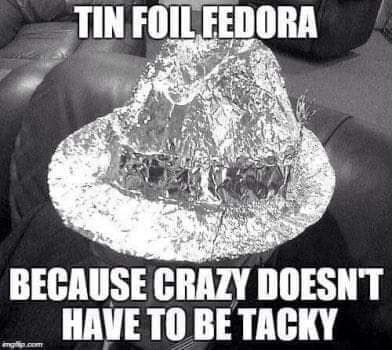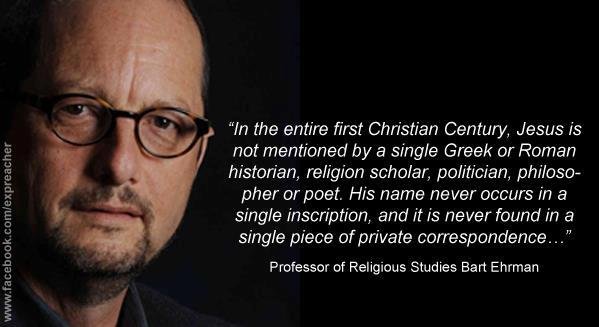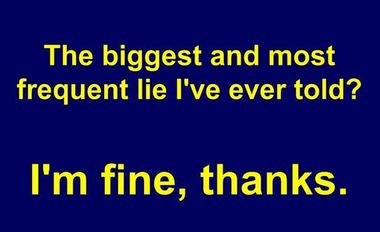
Our goal should be to believe as many true things as possible. This approach is antithetical to religious faith. Spare me the nonsense about rational or reasonable faith. Faith denies what we know to be true or what is likely true. People run to faith when they have no answers when asked to provide evidence for their claims. And that’s fine. We all exercise faith in our lives. I am woefully ignorant when it comes to science (and brain surgery). I know more today than I did yesterday about science, but I would never consider myself scientifically literate. Not illiterate, but not ready to lecture on any of the science disciplines. When I want or need information about the universe or our biological world, I turn to people with expertise in science — men and women who have spent years and decades studying their relevant field. Because I know what I don’t know, I put my faith in people who do know. This kind of faith is different from religious faith. Religious faith is a denial of what we know to be true. It is the rejection of facts and evidence about all sorts of things we know are true. That’s why no rational discussion is possible when an Evangelical appeals to faith to justify their beliefs.
Many Christians can compartmentalize their faith from what they know to be true. Scores of believers are scientists, doing excellent work in their relevant fields, while, at the same time, believing all sorts of religious nonsense or embracing subjective experiences as evidence for their claims. Personal testimonies, in particular, are often used as evidence for certain claims, but since their testimonies cannot be falsified or verified, they are no different from faith claims. But, Bruce, I KNOW, I KNOW, PRAISE JESUS, I KNOW that Jesus Christ delivered me from drug addiction. How can you possibly know Jesus delivered you? Is this not a faith claim? You may believe it to be true, but you cannot provide evidence for your claim. You may, in fact, no longer be a drug addict, but you cannot prove that it was Jesus who delivered you from your addiction.
Most Evangelicals grow up in Evangelical churches and spend their lives being indoctrinated and conditioned to believe things that are not true. From the cradle to the grave, their pastors — Sunday after Sunday — make all sorts of faith claims for which there is no evidence beyond the printed words of the Bible (as interpreted by them). Evangelicals will never be told that the Bible is a book of claims, and for those claims to be considered true, empirical evidence must be provided. Just because the Bible says Jesus was born of a virgin, resurrected from the dead, and ascended to Heaven doesn’t mean these claims are true. They might be, but proving them true requires more than prooftexts.
The average Evangelical spends thousands of hours by the time they reach adulthood hearing sermons and reading the Bible and religious books that make all sorts of fantastical claims. This indoctrination and conditioning robs people of the ability to reason and think rationally. How could it be otherwise? When faith trumps facts, it leads to irrational thinking. That’s why scores of people stupidly thought that Jesus was returning to Earth on April 8 to rapture (catch away) every bought-by-the-blood Christian. This claim has been made repeatedly over my sixty-seven years on planet earth, yet, here we are, no Jesus, no rapture. At what point do Evangelicals admit that they have been told a lie; that regardless of what Pastor Know-It-All says, Jesus ain’t coming back to earth? Answer? Never. Why? Faith. Sure, Jesus didn’t come back on April 8, but he could rapture Evangelicals away tomorrow, or next week, or next year, or two thousand years from now. Keep on believing, right?
When you are taught to think this way (as I was for most of my life), you are likely to fall for other unjustified/unwarranted beliefs. It is not surprising, then, that many of the people who tried to overthrow the U.S. government on January 6, are QAnon members; that many of those who embrace any and every conspiracy theory that comes down the pike are Evangelical Christians. When faith is part of the equation, no belief is out of bounds.
As I stated above, our goal should be to believe as many true things as possible. Anything that stands in the way of us achieving this goal should be abandoned, or, at the very least, not given priority in our thinking process. Facts come before faith, and if you have enough of them, faith is no longer necessary.
Bruce Gerencser, 66, lives in rural Northwest Ohio with his wife of 45 years. He and his wife have six grown children and thirteen grandchildren. Bruce pastored Evangelical churches for twenty-five years in Ohio, Texas, and Michigan. Bruce left the ministry in 2005, and in 2008 he left Christianity. Bruce is now a humanist and an atheist.
Connect with me on social media:
Your comments are welcome and appreciated. All first-time comments are moderated. Please read the commenting rules before commenting.
You can email Bruce via the Contact Form.



